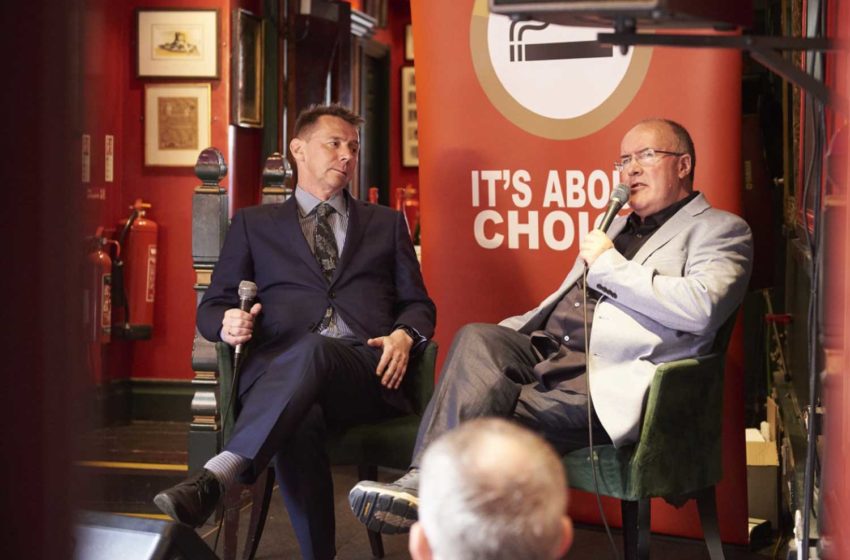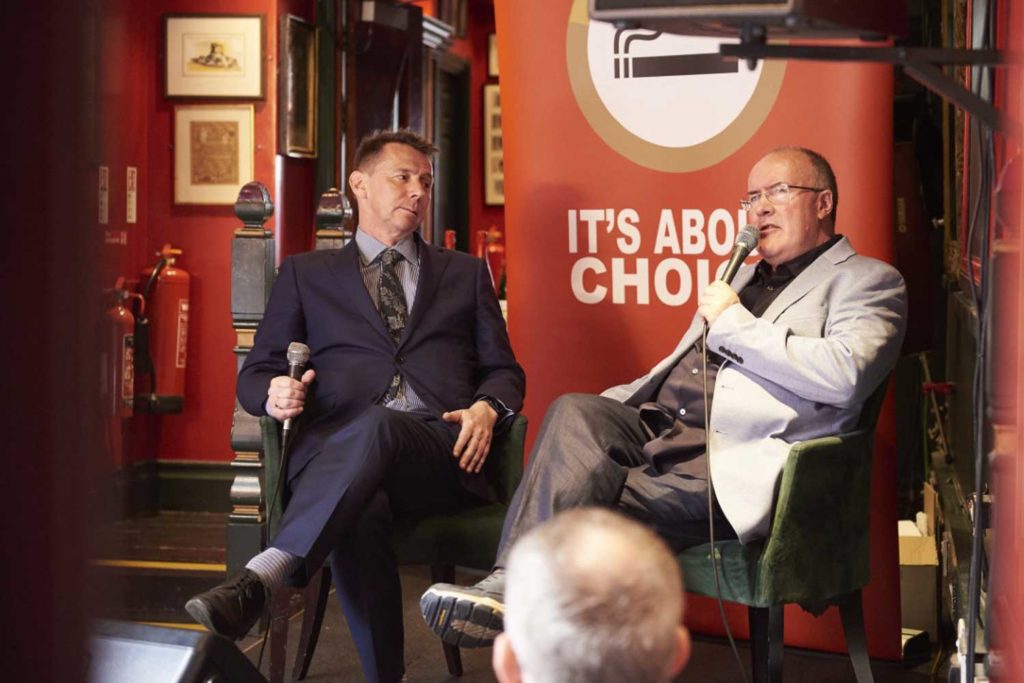Hear, Hear!
- Also in TR Print Edition
- August 1, 2022
- 0
- 10 minutes read


Participants in the Forest Summer Lunch event lament the continuing assaults on personal choice and personal responsibility.
By George Gay
And … (slight pause for effect) … the Golden Nanny Award goes to … (rustling of envelope) … Javed Khan!
Yes, during a ceremony that brought to a close the Forest Summer Lunch and Awards* at the Boisdale of Belgravia restaurant in London on July 5, Khan was recognized for his contribution to the nanny state. The event, which was co-hosted by Forest (Freedom Organization for the Right to Enjoy Tobacco, for the uninitiated) and Ranald Macdonald, managing director of Boisdale Restaurants, was attended by about 60 guests, who included friends of Forest, broadcasters, journalists, parliamentarians and think tank representatives.
Khan, however, was not in attendance, though he had been invited, so the award, presented by Forest Director Simon Clark, was collected by the editor of the Nanny State Index, Christopher Snowdon, who, unfortunately, was unable to guarantee that it would reach its intended recipient.
Khan’s absence was a pity because he had been a shoo-in for the award after the publication of his report, Making Smoking Obsolete, which was published June 9 as an independent review into the U.K. government’s smoke-free 2030 policies. The review had been commissioned by then Secretary of State for Health and Social Care Sajid Javid, apparently to help inform the government’s policies aimed at countering health inequalities within England, which are part of its “leveling up” agenda.
A story on MedPage Today described the Khan review as providing “cutting-edge recommendations with the aim of achieving a ‘smoke-free 2030,’” but to my way of thinking, the review is confusing, blinkered, paternalistic and spiteful in its calls for the further degrading of cigarettes and their packaging and the further impoverishment of smokers. But perhaps worst of all, it is devoid of new ideas, so its general theme is to suggest the way forward through the inflation of the failed policies of the past.
But perhaps none of this matters. Within three hours of Khan’s award being announced, though, I should emphasize, unconnected with the announcement, Sajid Javid resigned from the front bench in what was to become a government meltdown that, over a couple of days, saw the resignation of almost 60 ministers and culminated in that of the prime minister, Boris Johnson. The ruling Conservative Party is deeply divided, and what happens in respect of the review’s recommendations could well depend partly on who the party picks as its new leader and, therefore, the new prime minister. It should be pointed out, however, that it is unlikely the result of the leadership contest will provide good news for smokers—just varying degrees of bad news.
Speaking during an after-lunch Q&A session conducted by Mark Littlewood, the director general of the Institute of Economic Affairs, Clark said he was opposed to targets such as the smoke-free 2030 goal. Forest had no problem with the falling smoking rates of the past 50 years. Society had changed, he said. People now knew about the health risks associated with smoking, and many were choosing to switch to products that were less risky than cigarettes. But Forest believed that decisions about quitting smoking should be made on the basis of choice and personal responsibility. It was against people being forced or coerced into giving up smoking, which was a possibility given that the “ludicrous” smoke-free 2030 target could not be achieved on a voluntary basis. If the Khan review was accepted, smokers were going to be coerced into quitting through a range of measures, including the extension of smoking bans from inside hospitality venues to outside those venues, and by pushing up taxes, which would force even more people into poverty.
In addition, Clark expressed concern that even if the government achieved its target, those opposed to tobacco would not be satisfied. At the moment, many of them said that vaping was a good alternative to smoking, but their long-term goal was not smoke-free—it was tobacco-free and nicotine-free. “These people will never stop, and we have to stand up to them,” he said to loud applause from guests who listened to Clark throughout with respect, interspersed with whoops of delight and cries of “hear, hear!”
Turning to what he described as Khan’s “so-called independent review,” Clark pointed out that the acknowledgements made in one of its appendices comprised a who’s who of tobacco control. Forest tried to engage with Khan during the review period, but it wasn’t clear whether he had even read its submission because the only response it received was a note saying that, under article 5.3 of the World Health Organization Framework Convention on Tobacco Control, he couldn’t engage with Forest. It was rather pathetic, Clark said, when somebody who was supposed to be conducting an independent review would not engage with representatives of an important stakeholder. Why would you conduct a review if you were not prepared to engage with that important group of people? Such a stance suggested that Khan had no interest in the views of the people who comprised this group, no interest in why they smoked or why they enjoyed smoking and no interest in why they didn’t want to quit.
Khan, Clark said, had made about 14 recommendations, but it was interesting that, given that it was an independent review, he hadn’t come up with a single original idea. The ideas were all copied from New Zealand, Canada, the U.S. and elsewhere. And they included some bizarre ideas, such as changing the color of cigarettes to dirty green. This was an attempt to take cigarette sticks down the same path as cigarette packaging, which had been turned into “plain packaging.” There was no evidence that plain packaging had made any difference whatsoever to smoking rates, so the idea that smokers were going to give up simply because the color of their cigarettes had been changed was nonsense.
Currently, cigarette packs carry huge warnings, so everybody is aware that there are serious health risks associated with smoking, but now Khan wants “smoking kills” written on the side of cigarettes. How far was this going to go? Clark mused. This latest review showed how desperate the anti-smoking lobby had become. “We’ve had enough education, we’ve had enough regulation, we’ve had enough legislation; just let it go,” he said.
It would seem that the public, too, has had enough. Last week, said Clark, on the 15th anniversary of the smoking ban, Forest had carried out a poll in which it asked 2,000 people what the government’s priorities should be, and, of the 10 options given, the top three were tackling the rising cost of energy and gas, tackling rising inflation and improving the health service. Some of the issues that people thought the government should treat as moderately important were helping businesses recover from the impact of the pandemic, addressing care for the elderly and tackling the housing shortage. The topics that were deemed the least important were tackling smoking, tackling the misuse of alcohol, tackling obesity and tackling climate change.
In fact, the previous paragraph should probably have opened with, “It would seem that the public, too, has for a long time had enough.” Clark said that Forest had been running annual polls for many years, and it had always turned out that people did not consider tackling smoking to be an important priority for this or any other government. “It was time governments started listening,” he said.
Finally, Clark, who has been at Forest since 1999, was asked what the future held given that the percentage of British people who smoked had dropped from about 40 in 1979, when Forest was formed, to about 14 now. From the Forest point of view, he said, he wasn’t looking forward very far. He didn’t know where we were going to be in 15–25 years, though he believed there would still be a substantial number of people smoking.
But Clark said that for him, Forest had never been just about smoking, a point that is hinted at in the first two words of the organization’s full name, Freedom Organization for the Right to Enjoy Tobacco, and that is underlined by the guestlists of Forest events, which comprise mostly people who can be described loosely as libertarians, some of whom are smokers. “It’s always been about personal choice and personal responsibility,” he said. “They are the principles that we have been fighting for, and those principles don’t age. And that is why I think there will always be a role for a group like Forest, even if it has to change its name in the future because there are so few actual tobacco smokers. It’s all about choice and personal responsibility, and we need to put those issues, those principles, higher up on the political agenda because in recent decades, politicians seem to have forgotten about them.”
*Special presentations were made during the awards ceremony to Liz Barber and Pat Nurse, described as two Forest supporters who previously had remained unsung heroes.
The first award of the afternoon went to the semi-retired Daily Mail columnist Tom Utley, who was painted as a smoker of heroic proportions and who was said to be described by Wikipedia as having made a career out of opposing wokery. Second up was Will Lloyd, the commissioning editor of Britain’s Unheard online magazine, who collected an award on behalf of David Hockney, described as arguably Britain’s greatest living artist and, despite the best efforts of Utley, unarguably its greatest smoker.
Then, after Snowdon had stood in for Khan, a special award was made to Ranald Macdonald for his longstanding but hitherto officially unrecognized support of Forest, which, over the years, had included hosting numerous events at Boisdale venues.

